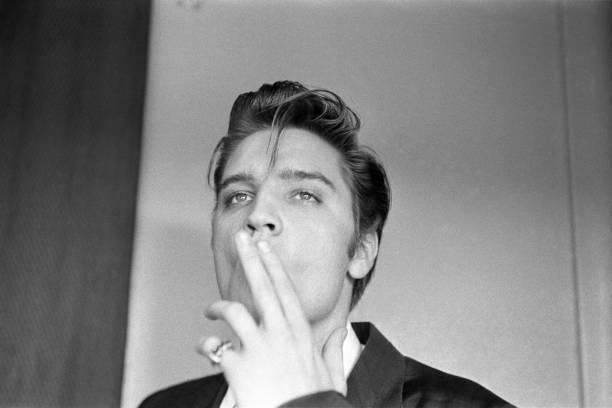 Introduction and Short Summary of the Song
Introduction and Short Summary of the Song
Released in 1965 as part of the soundtrack for the film Girl Happy, “Puppet on a String” is one of Elvis Presley’s most polished and pop-oriented mid-1960s ballads. Written by Sid Tepper and Roy C. Bennett, longtime contributors to Presley’s film catalog, the song captures the vulnerability of being completely enthralled by love—so much so that the narrator feels like a puppet controlled by another’s hand. With its catchy melody, lush orchestration, and Presley’s heartfelt delivery, the track became the standout single from the Girl Happy soundtrack, climbing to number 14 on the Billboard Hot 100. While firmly within Presley’s movie-song framework, it resonated with fans as an engaging pop ballad that combined sincerity with mainstream appeal.
Origins of the Song
“Puppet on a String” was composed by Tepper and Bennett, who had already written dozens of songs for Presley, including “The Walls Have Ears,” “G.I. Blues,” and “Hawaiian Sunset.” Their work was often tailored to the lighthearted tone of Presley’s films, but “Puppet on a String” offered slightly more emotional depth than typical soundtrack fare.
---> Scroll down for the VIDEO
Presley recorded the track on June 16, 1964, at Radio Recorders in Hollywood during the sessions for Girl Happy. The movie, released in March 1965, was a romantic musical comedy set during spring break in Fort Lauderdale, Florida. While most of the songs in the soundtrack leaned toward fun, beach-party themes, “Puppet on a String” stood out for its more serious tone and broader pop appeal.
Why Elvis Released “Puppet on a String”
RCA and MGM recognized the song’s potential and chose it as the primary single from the Girl Happy soundtrack. Released in March 1965, the single quickly climbed the charts, proving that even in an era dominated by the Beatles and the British Invasion, Presley could still deliver Top 20 hits.
---> Scroll down for the VIDEO
The decision to release it highlighted RCA’s strategy of balancing Presley’s commercial viability with his film obligations. While much of his film music was criticized for being formulaic, “Puppet on a String” managed to rise above the criticism, appealing to radio audiences as a stand-alone pop single.
The Message Conveyed in the Song
The lyrics describe the narrator’s sense of being helplessly in love, likening himself to a puppet whose strings are pulled by his romantic partner:
“Every time you look at me,
I’m as helpless as can be.”
The metaphor is simple but effective, capturing the loss of control that comes with being completely infatuated. Love here is not destructive, but it renders the narrator powerless, turning him into an object guided entirely by the other’s desires.
Presley’s delivery balances vulnerability with sincerity. He conveys the sweetness of surrendering to love without slipping into melodrama, making the metaphor relatable and endearing.
The Recording and Musical Characteristics
“Puppet on a String” reflects the polished pop style of Presley’s mid-1960s soundtrack recordings, with professional studio musicians and arrangers shaping the sound.
-
Vocals: Presley’s voice is smooth, tender, and expressive. He emphasizes the vulnerability of the lyrics with gentle phrasing and subtle dynamic shifts.
-
Instrumentation: The arrangement includes strings, piano, acoustic guitar, bass, and light percussion, creating a lush, radio-friendly sound.
-
Backing vocals: Harmonies from the Jordanaires add warmth and depth to the track.
-
Mood: Romantic and reflective, the song conveys a mixture of sweetness and melancholy.
-
Style: Firmly in the pop-ballad tradition, the song aligns with the mainstream sound of the mid-1960s while retaining Presley’s vocal signature.
The production ensured that the track was accessible to both teenage audiences and adult listeners, helping it succeed commercially.
Cultural and Commercial Impact
“Puppet on a String” was a commercial success, reaching number 14 on the Billboard Hot 100 and number 3 on the Adult Contemporary chart. Internationally, it performed well in markets such as Canada and parts of Europe, reinforcing Presley’s global popularity.
Culturally, the song represented Presley’s continued relevance in a rapidly shifting musical landscape. Although critics often dismissed his film music, “Puppet on a String” demonstrated that even within the constraints of a soundtrack, Presley could deliver a song that stood on its own merit.
The track also reinforced Presley’s romantic image in the mid-1960s. While his early career had been defined by rebellious rock-and-roll, by this point he was equally associated with tender ballads that showcased his sensitivity and emotional range.
Legacy of “Puppet on a String”
Today, “Puppet on a String” is remembered as one of Elvis Presley’s stronger soundtrack singles of the 1960s. While it may not have the enduring cultural impact of his biggest hits, it remains a fan favorite for its sincerity, melodic appeal, and heartfelt performance.
For fans, the song highlights Presley’s ability to bring credibility to material that could have been dismissed as lightweight. His vocal interpretation elevates the simple metaphor into a touching reflection on vulnerability in love.
More broadly, the track illustrates Presley’s enduring artistry during a period often criticized for its reliance on formulaic film projects. Even within those constraints, Presley was able to create recordings that have lasted decades.
More than half a century later, “Puppet on a String” continues to resonate as a charming, tender ballad. It serves as a reminder that even in the middle of his Hollywood years, Presley’s voice and interpretive talent could transform a straightforward pop song into something timeless and emotionally engaging.